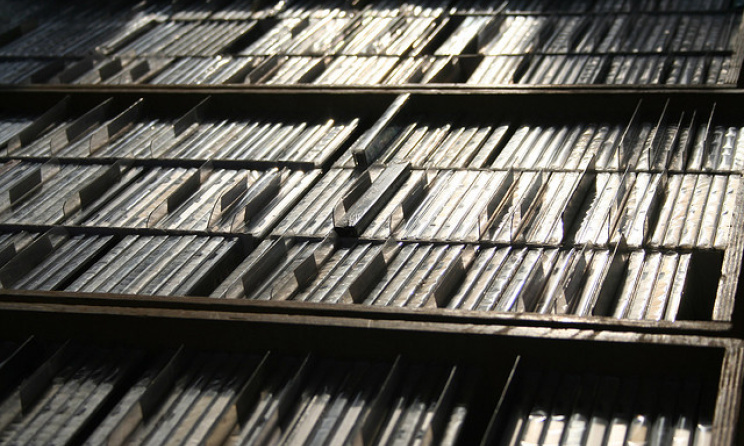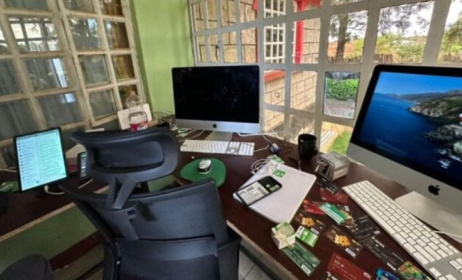Music piracy in Mali
By Bram Posthumus
The music industry in Mali is in a bad way, especially following the invasions of early 2012, which brought groups of unruly assailants into the North of the country, first Touareg rebels, then the jihadists extremists, who gained notoriety by smashing up musical instruments and committing countless other acts of cultural vandalism. In the midst of all this, there was also the coup of Captain Amadou Haya Sanogo, on 22 March 2012. Mali’s economy contracted by 5% in 2012, a further 1% the next year.
 Photo: Flickr/minarai
Photo: Flickr/minarai
Especially hard hit was tourism and that, in its turn, contributed to an ever deeper malaise in the music business. Tourism had become, along with remittances, gold and cotton a major source of income for Mali and Malians. But the number of visitors dropped precipitously, from 160,000 in 2012 to 134,000 the next year, a near 20% drop. (World Bank, 2012). No figures are available beyond 2012, but given that conflict, kidnappings and negative travel warnings will likely have served as further deterrents it is safe to assume that the 2013 and 2014 figures will lie significantly below 2013 levels. Today, just a few go to Bamako’s once flourishing concert halls and clubs.
Historical Background
The short-lived tourism boom was only the latest incarnation of a mechanism that has kept Mali’s music alive for many centuries: patronage by private individuals. In the traditional context (i.e. the ancient Mande Empires), patronage would be distributed by the ruler, who would remunerate traditional chroniqeurs and praise singers (jelis, known elsewhere as griots). The system survives in different shapes until these days: the rich and the powerful pay for music made in their honour. During the 1960s, in the heady days of independence from France, this role was briefly assumed by the state, which sponsored national orchestras and paid its musicians (author’s interview with guitarist and composer Amadou Bakayoko, Amsterdam, 24 March 2009). In so doing, it built up an embryonic music industry with live venues, a radio that not only provided airplay but also recorded the music and remuneration. It was a promising start, which ended abruptly when a 1968 coup removed Mali’s first president, Modibo Keita. Loss of income and an increasingly stifling artistic climate compelled almost all great Malian stars to leave the country and move, first to Abidjan and then to Paris.
Piracy had, by then, already become part of the picture and was allowed to flourish once state control of music disappeared. Since then, it has grasped every single new opportunity that has come its way: first cassettes and now, of course, digital multiplication. Since another coup (in 1991) brought a temporary end to military dictatorship, every government has promised that it would tackle piracy. The results have, by and large, been underwhelming and a major blow to a music industry that is, according to a EU report issued in 2006, worth in total about $130m and employs as many as 3,000 (Heau, Simeone, Ndiaye, 2006, page 34)).
Music Piracy Today
Oumar Konaté, an upcoming songwriter, guitarist and bandleader from Gao in the troubled northeast of the country, relies on international exposure to make some money from his music. He has worked with the likes of Vieux Farka Touré and Khaira Arby and has toured with his own band in Sweden and the United States. His new album, Addoh, appeared in May 2014 on the US-based Clermont label. In Mali itself, this graduate of the National Arts Academy[i] in Bamako has a job as a music teacher. ‘You know, the music industry here is not going anywhere,’ he says. ‘When I put a CD on the market, you can be assured that there will be someone who buys one copy and puts it on a computer. Next, he will be selling my songs for 30 francs ($0.06) to anyone who wants to play my music on a mobile phone. I make no money from it because copyright doesn’t exist’ (Personal interview, 2014).
Boubacar Traoré makes a similar point. He works with Mali Music, a distribution company. He argues that an illegal CD sells for up to five times less (300 CFA Francs, $0.60 versus 1,500 CFA Francs, $3.00) than an officially authorised one, which renders the choice very simple for your average Malian consumer. The average drift between non-official and official prices remains largely unchanged today.
In an academic paper, Ryan Thomas Skinner (2012) quotes a few of the figures available, even though one must qualify these by saying that they are about a decade old and come from the owners of two, now defunct, cassette producing companies, Seydoni-Mali and Mali K7. Significantly though, both businessmen told the writer that out of every 10 cassettes on the market, 9 were pirated. Those margins have since become even smaller (Skinner, 2012). The owner of a surviving production company, Jamnaty Production, told writer and music journalist Andy Morgan (2013) that thanks to mobile phones and their Bluetooth copying facilities, the percentage of pirated music now lies between 95% and 98%. Music can be clandestinely copied in Mali itself but illegal units have been arriving in bulk from Bénin, Nigeria, Dubai, India and China (Morgan, 2013). The margins for everyone involved in this trade, copying operators, transporters, corrupt customs officers who let the contraband through, are wafer-thin. For the musician, they are non-existent, as no rights whatsoever are paid on these illegal duplications. Hence Oumar’s practical assessment that copyright, to all intents and purposes, does not exist.
Live performances and the remainders of the old patronage system may still be viable ways towards earning an income, and: you can attempt to shift units in the hotels, bars and other surviving live venues - or indeed at weddings, baptisms or births. Clearly, though, there is very little incentive to produce an album just for the sake of having something out there. Witness this quote by arguably Mali’s largest-ever star, Salif Keita, who in 2012 told the Paris weekly Jeune Afrique, that his latest production, Talé, was to be his last. He explicitly cited digital copying practices as one of the reasons (Roger, 2012). Andy Morgan writes in his 2013 book Music, Culture & Conflict that piracy, routinely ignored by successive governments, military or nominally democratic, has not so much put the Malian music industry into intensive care; piracy has put it in the morgue (Morgan, 2013). Yes, there are still artists who continue to produce CDs but many among those are heavily sponsored by corporations, donor agencies, rich individuals or a combination of those; all in the best traditions of patronage.
Anti-Piracy Measures
The government of president Ibrahim Boubacar Keïta was the umpteenth to announce that it was prepared to tackle the piracy problem. This is what the culture minister, N’Diaye Ramatoulaye Diallo, had to say during a meeting in June 2014 with a wide variety of cultural entrepreneurs, artists and journalists in the prestigious National Museum in Bamako: ‘The cultural industry…is ravaged by a piracy that grows every day and takes on ever more varied and complex forms. Piracy kills creativity, without which there is no cultural industry, no development.’ (Doumbia, 2014) The minister recalled that on 30 April, 2014, the government had adopted a decree governing the distribution of author’s rights and what are called neighbouring rights (droit d’auteur and droits voisins), respectively the rights of authors to receive royalties when their music is played on air and multiplied but also, in the second case, when somebody else covers their music (Doumbia, 2014).
Promptly, reports started appearing in the Malian press, on paper and online, about raids carried out by agents working on behalf of BUMDA (Bureau Malien du Droit d’Auteur) who, reportedly, took in thousands of CDs, DVDs and computers that had allegedly been used for duplication. People had been arrested and put on trial. The Bureau had even gone after hotel and bar owners who were playing music without paying rights (Haidara, 2014). Healthy scepticism is in order. BUMDA has made earlier claims that between 2000 and 2009 it seized well over 600,000 illegal CDs. This may look impressive but it clearly has not made any dent in Mali’s thriving piracy industry. The method is invariably the same: a descent on the markets where the illegal copies are sold, arrests of the vendors who are at the tail end of the chain and a lot of noise in the local press about the success of the latest action. Until the complaints return. Clearly, this approach is not working.
Salif Keita, who also heads the Malian Artists Union, told Afropop Worldwide in a 2002 interview that the driving forces behind the piracy were in fact local religious leaders who ran powerful businesses (Eyre, Barlow, 2002). Thus considered, piracy becomes in actual fact a form of censorship: religious leaders wreak economic destruction, through piracy, on music they do not approve of. It goes beyond the scope of this paper to explore this further but clearly the confluence and possible mutual reinforcement of religious censorship, alluded to here, require better investigation. After all, religious censorship happened even before jihadist extremists made their violent appearance in Mali and the role of “untouchable” religious leaders in perpetuating the problem is an important one.
The young and upcoming Malian rapper Mahamadou Soumbounou (better known as Mylmo N-Sahel) has found another solution, which is entirely in keeping with the digital age and takes into account the presence of a huge Malian diaspora all around the world. He explains the model: “My last album was put on the market but this time around we have deals with structures like Orange Money (a method of payment by mobile phone). We sell the album online; the first time anyone has done this in Mali. We sell it online for the fans outside Mali, they can buy it with their credit card. You see, we have this Bluetooth and USB stick problem here, so hopefully, selling online will get us some money so we can develop as artists.” (Personal interview, 2014).
Conclusion
The use of mobile phones that can play music is becoming ever more widespread and this has opened the floodgates for pirated material even wider than they already were. Absent tangible political will to tackle piracy – apart from the odd public pronouncement that almost all Malian government have indulged in since 1991 – recording albums for the local market is, financially speaking, a dead-end street for artists. Some have found innovative ways to sell albums or individual tracks online and/on abroad but other than that, it is sponsored performances – sometimes in combination with other occupations – that enable musicians to survive. Of course, musicians will continue to make records, even for the local market, but they do not labour under the illusion that this will earn them even the most modest of incomes.
Sources:
Doumbia, Y. 2014. « Culture: en attendant les états généraux », in: L’Essor, published in Reporter No 6, Bamako, 27 June 2014, page 5. Newspaper in author’s possession.
Eyre, Banning and Barlow, Sean. 2002. Interview with Salif Keita on Afropop Worldwide. New York. Still partly available via Freemuse on http://freemuse.org/archives/263
Haidara, Alou. 2014. “Mali : La Tolérance Zéro Du Bumda Aux Pirates En Marche : Plus De 10 000 Cd Saisis, 11 Condamnations Et 14 Promoteurs D’hôtel, De Bar-Restaurant Entendus Par La Bij”. In L’Indépendant, Bamako. Published by Maliactu.net on 18 September 2014 at <http://maliactu.net/mali-la-tolerance-zero-du-bumda-aux-pirates-en-march...
Héau, Laurence, Simeone, Gian Giuseppe and Ndiaye, Alioune Ifra. “Mission d’évaluation et de prospective de l’appui de la CE au secteur de la culture au Mali” (Ministère de la Culture du Mali – Délégation de l’Union européenne), Brussels, June 2006, pp 34-38.
Lee, Hélène. 2005. “Les tribulations de la musique malienne”. RFI, Paris, 16 September. <http://www.rfimusique.com/musiquefr/articles/070/article_15766.asp>
Morgan, Andy. 2013. Music, Culture & Conflict in Mali. Copenhagen: Freemuse.
Morgan, Andy. 2014. “Les Ambassadeurs, the band that changed the face of West African music”. Sleeve notes to Stern’s re-release of Les Ambassadeurs classics, London: Sterns.
Posthumus, Bram. 2014. Author’s interviews with Oumar Konaté and Mylmo N-Sahel, Bamako, June 2014.
Raiche-Nogue, Pascal. 2010. “Industrie de la musique, le piratage, un fléau persistant”. Published at BaManet on 5 August 2010 at <http://bamanet.net/showbiz/industrie-de-la-musiquele-piratage-un-fleau-p...
Roger, Benjamin. 2012. “Mali: Des maux et des notes”. In Jeune Afrique, 2-8 December. <http://www.jeuneafrique.com/Article/JA2708p078-083.xml0/>
Skinner, Ryan Thomas. 2012. “Artists, music piracy and the crisis of political subjectivity in contemporary Mali”. In Anthropological Quarterly, 85(3). Washington, DC: Institute for Ethnographic Research, pp 723-754.
World Bank data 2012, accessed on October 15, 2014 at <http://data.worldbank.org/indicator/ST.INT.ARVL>
[i] Boulevard du Peule/Rue Pasteur, Bamako - phone: + 223 2021 5074




























Comments
Log in or register to post comments